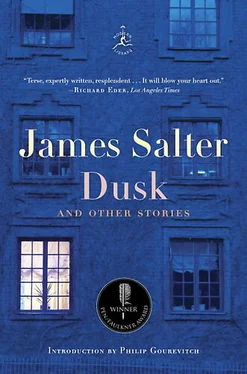“At his hotel…”
Mirella waited.
“I brought him some letters. He insisted I stay and talk. He wanted to give me a drink. Finally he tried to kiss me. He fell on his knees—I was cowering on the divan—and said, Eva, you smell so sweet. I tried to pretend it was all a joke.”
The joys of rectitude. They drove around in little Fiats. They paid attention to their clothes.
The film was going well, a day ahead of schedule. Iles was working with a kind of vast assurance. He roamed around the great, black Mitchell in tennis shoes, he ate no lunch. The rushes were said to be extraordinary. Guivi never went to see them. Anna asked Lang about them, what did he think? He tried to decide. She was beautiful in them, he told her—it was true—there was a quality in her face which illuminated the entire film… he never finished. As usual, she was disinterested. She had already turned to someone else, the cameraman.
“Did you see them?” she said.
Iles wore an old sweater, the hair hung in his face. Two films a year, he repeated… that was the keystone of all his belief. Eisenstein only made six altogether, but he didn’t work under the American system. Anyway, Iles had no confidence when he was at rest.
Whatever his weaknesses, his act of grandeur was in concealing the knowledge that the film was already wreckage: Guivi was simply not good enough, he worked without thinking, he worked as one eats a meal. Iles knew actors.
Farewell, Guivi. It was the announcement of death. He was already beginning to enter the past. He signed autographs, the space showing between his teeth. He charmed journalists. The perfect victim, he suspected nothing. The glory of his life had blinded him. He dined at the best tables, a bottle of fine Bordeaux before him. He mimicked the foolishness of Iles.
“Guivi, my love,” he imitated, “the trouble is you are Russian, you are moody and violent. He’s telling me what it is to be Russian. Next he’ll start describing life under communism.”
Anna was eating with very slow bites.
“Do you know something?” she said calmly.
He waited.
“I’ve never been so happy.”
“Really?”
“Not in my whole life,” she said.
He smiled. His smile was opera.
“With you I am the woman everyone believes I am,” she said.
He looked at her long and deeply. His eyes were dark, the pupils invisible. Love scenes during the day, he thought wearily, love scenes at night. People were watching them from all around the room. When they rose to go, the waiters crowded near the door.
Within three years his career would be over. He would see himself in the flickering television as if it were some curious dream. He invested in apartment houses, he owned land in Spain. He would become like a woman, jealous, unforgiving, and perhaps one day in a restaurant even see Iles with a young actor, explaining with the heat of a fanatic some very ordinary idea. Guivi was thirty-seven. He had a moment on the screen that would never be forgotten. Tinted posters of him would peel from the sides of buildings more and more remote, the resemblance fading, his name becoming stale. He would smile across alleys, into the sour darkness. Far-off dogs were barking. The streets smelled of the poor.
There was a party for Anna’s birthday at a restaurant in the outskirts, the restaurant in which Farouk, falling backward from the table, had died. Not everyone was invited. It was meant to be a surprise.
She arrived with Guivi. She was not a woman, she was a minor deity, she was some beautiful animal innocent of its grace. It was February, the night was cold. The chauffeurs waited inside the cars. Later they gathered quietly in the cloakroom.
“My love,” Iles said to her, “you are going to be very, very happy.”
“Really?”
He put his arm around her without replying; he nodded. The shooting was almost over. The rushes, he said, were the best he had ever seen. Ever.
“As for this fellow…” he said, reaching for Guivi.
The producer joined them.
“I want you for my next picture, both of you,” he announced. He was wearing a suit a size too small, a velvet suit bought on Via Borgognona.
“Where did you get it?” Guivi said. “It’s fantastic. Who is supposed to be the star here anyway?”
Posener looked down at himself. He smiled like a guilty boy.
“Do you like it?” he said. “Really?”
“No, where did you get it?”
“I’ll send you one tomorrow.”
“No, no…”
“Guivi, please,” he begged, “I want to.”
He was filled with goodwill, the worst was past. The actors had not run away or refused to work, he was overcome with love for them, as for a bad child who unexpectedly does something good. He felt he must do something in return.
“Waiter!” he cried. He looked around, his gestures always seemed wasted, vanished in empty air.
“Waiter,” he called, “champagne!”
There were twenty or so people in the room, other actors, the American wife of a count. At the table Guivi told stories. He drank like a Georgian prince, he had plans for Geneva, Gstaad. There was the Italian producer, he said, who had an actress under contract, she was a second Sophia Loren. He had made a fortune with her. Her films were only shown in Italy, but everyone went to them, the money was pouring in. He always kept the journalists away, however, he never let them talk to her alone.
“Sellerio,” someone guessed.
“Yes,” said Guivi, “that’s right. Do you know the rest of the story?”
“He sold her.”
But half the contract only, Guivi said. Her popularity was fading, he wanted to get everything he could. There was a big ceremony, they invited all the press. She was going to sign. She picked up the pen and leaned forward a little for the photographers, you know, she had these enormous, eh… well, anyway, on the paper she wrote: with his finger Guivi made a large X. The newsmen all looked at each other. Then Sellerio took the pen and very grandly, just below her name: Guivi made one X and next to it, carefully, another. Illiterate. That’s the truth. They asked him, look, what is the second X for? You know what he told them? Dottore .
They laughed. He told them about shooting in Naples with a producer so cheap he threw a cable across the trolley wires to steal power. He was clever, Guivi, he was a storyteller in the tradition of the east, he could speak three languages. Later, when she finally understood what had happened, Anna remembered how happy he seemed this night.
“Shall we go on to the Hostaria?” the producer said.
“What?” Guivi asked.
“The Hostaria…” As with the waiters, it seemed no one heard him. “The Blue Bar. Come on, we’re going to the Blue Bar,” he announced.
Outside the Botanical Gardens, parked in the cold, the small windows of the car frosted, Lang sat. His clothing was open. His flesh was pale in the refracted light. He had eaten dinner with Eva. She had talked for hours in a low, uncertain voice, it was a night for stories, she had told him everything, about Coleman the head of publicity, Mirella, her brother, Sicily, life. On the road to the mountains which overlooked Palermo there were cars parked at five in the afternoon. In each one was a couple, the man with a handkerchief spread in his lap.
“I am so lonely,” she said suddenly.
She had only three friends, she saw them all the time. They went to the theater together, the ballet. One was an actress. One was married. She was silent, she seemed to wait. The cold was everywhere, it covered the glass. Her breath was in crystals, visible in the dark.
“Can I kiss it?” she said.
She began to moan then, as if it were holy. She touched it with her forehead. She was murmuring. The nape of her neck was bare.
Читать дальше












